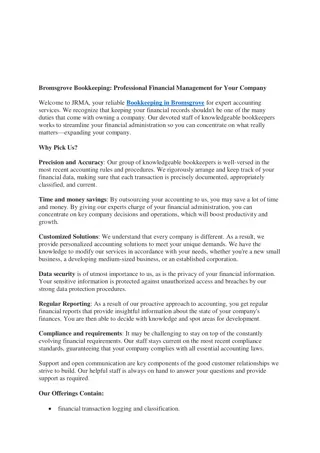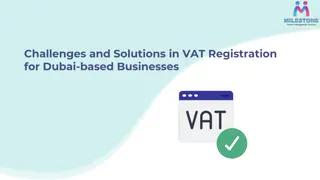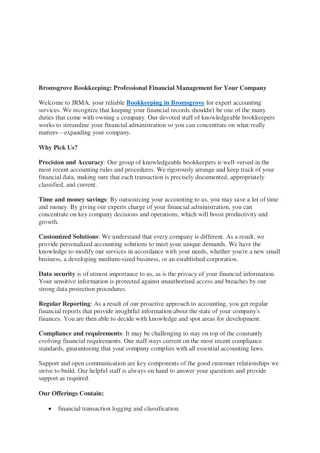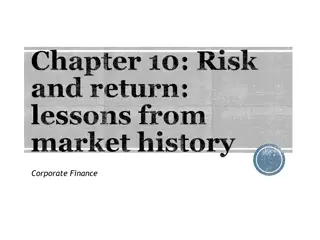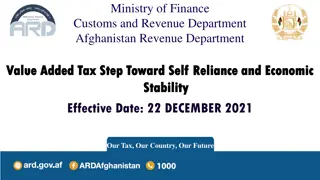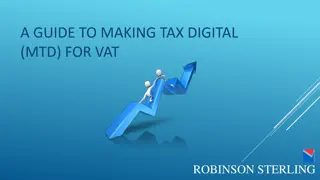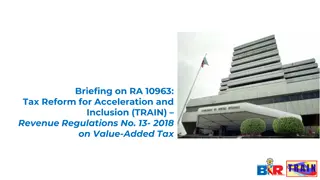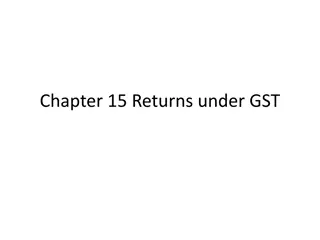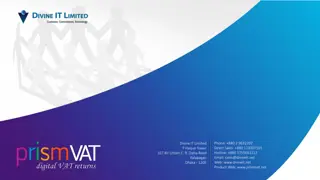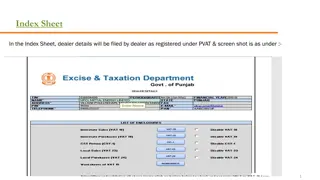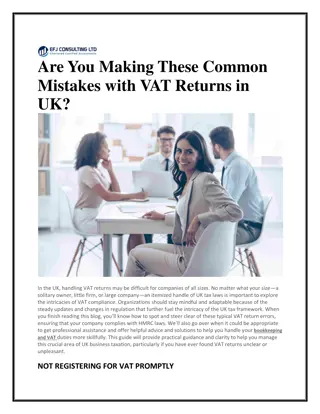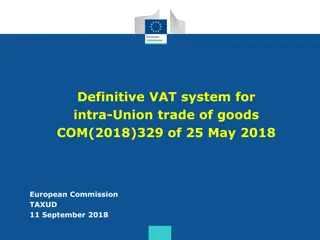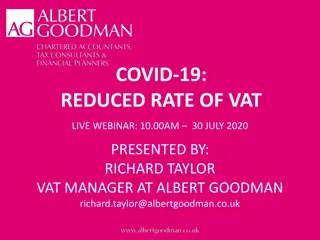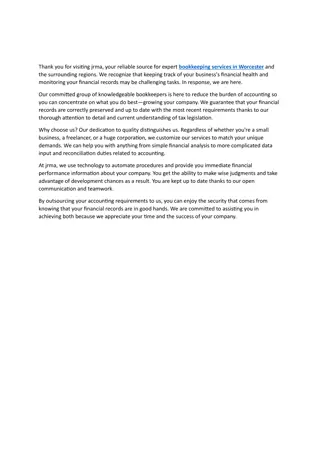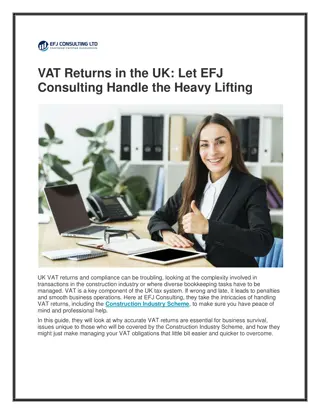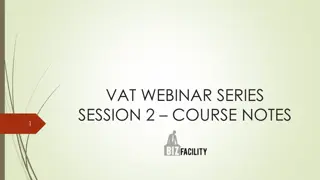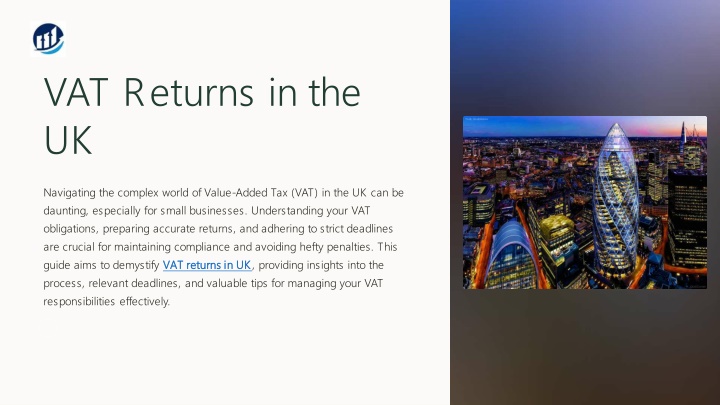
VAT-Returns-in-the-UK
VAT returns in UK
Download Presentation

Please find below an Image/Link to download the presentation.
The content on the website is provided AS IS for your information and personal use only. It may not be sold, licensed, or shared on other websites without obtaining consent from the author. If you encounter any issues during the download, it is possible that the publisher has removed the file from their server.
You are allowed to download the files provided on this website for personal or commercial use, subject to the condition that they are used lawfully. All files are the property of their respective owners.
The content on the website is provided AS IS for your information and personal use only. It may not be sold, licensed, or shared on other websites without obtaining consent from the author.
E N D
Presentation Transcript
VAT Returns in the UK Navigating the complex world of Value-Added Tax (VAT) in the UK can be daunting, especially for small businesses. Understanding your VAT obligations, preparing accurate returns, and adhering to strict deadlines are crucial for maintaining compliance and avoiding hefty penalties. This guide aims to demystify VAT returns VAT returns in UK in UK, providing insights into the process, relevant deadlines, and valuable tips for managing your VAT responsibilities effectively.
Understanding VAT Obligations VAT Registration Threshold VAT Rates In the UK, businesses are required to register for VAT if their annual taxable turnover exceeds 85,000. This threshold applies to the total value of goods and services sold, excluding VAT. Failing to register for VAT when required can lead to penalties. The standard VAT rate in the UK is 20%. However, certain goods and services are subject to reduced rates (5%) or zero- rating (0%). It's essential to understand the different rates applicable to your business activities. VAT Filing Frequency Businesses with a taxable turnover exceeding the VAT threshold are typically required to submit VAT returns quarterly. However, smaller businesses with a lower turnover may be eligible to file returns annually. Your filing frequency will be determined by HMRC based on your business's specific circumstances.
Preparing VAT Returns Gather Relevant Data 1 This includes sales invoices, purchase invoices, and any other relevant documentation that supports your VAT calculations. Accurate record- keeping is crucial for accurate VAT reporting. Calculate VAT Payable or Refundable 2 Use HMRC's online VAT return form or software to calculate the VAT you owe or are eligible for a refund. Separate your sales into standard-rated, reduced-rated, and zero-rated categories. Submit Your VAT Return 3 File your completed VAT return through HMRC's online portal or by post, adhering to the designated deadlines. Be sure to keep a copy of your submitted return for your records.
Deadlines and Penalties Quarterly Returns Annual Returns 1 2 VAT returns are due at the end of the first month after the end of each quarter. For example, the return for the period 1st January to 31st March is due on 30th April. Businesses allowed to file annually have a deadline of 1st January following the end of their tax year (6th April to 5th April). Penalties 3 Failure to meet VAT deadlines can result in late filing penalties. Penalties also apply for incorrect VAT calculations or fraudulent activity.
Claiming VAT Refunds Eligibility Submitting a Claim Processing Time Businesses can claim VAT refunds if they have overpaid VAT. This can occur when your VAT input (VAT paid on purchases) exceeds your VAT output (VAT charged on sales). You can claim refunds for both standard- rated and reduced-rated VAT. You can claim a VAT refund by completing a VAT return and stating the amount you are claiming. You can also claim a VAT refund for goods and services acquired abroad. HMRC typically processes VAT refund claims within 30 days, but it can sometimes take longer. You can track the status of your claim through HMRC's online portal.
VAT Record-Keeping Detailed Records Maintain detailed records of all your VAT transactions, including sales invoices, purchase invoices, and any other relevant documents. These records should be kept for at least six years. Accurate Calculations Ensure your VAT calculations are accurate and supported by your records. Use VAT-compliant accounting software or spreadsheets to manage your VAT transactions. Organized System Establish a clear and organized system for storing and managing your VAT records. This will make it easier to retrieve information when needed and avoid errors.
Working with an Accountant Accountants have specialized knowledge of bookkeeping and VAT & only VAT regulations and can provide expert advice on navigating complex VAT requirements. An accountant can help ensure your VAT returns are accurate and compliant, minimizing the risk of penalties. Accountants can assist with tax planning strategies to optimize your business's VAT liability and minimize your tax burden. Accountants provide ongoing support and guidance throughout the year, addressing any questions or concerns you may have about VAT.
EFJ Consulting Services VAT Registration & Compliance Ensuring your business is registered correctly and adhering to all relevant VAT regulations VAT Return Preparation Preparing accurate and timely VAT returns to avoid penalties VAT Refund Claims Assisting businesses in claiming VAT refunds they are entitled to VAT Record-Keeping Establishing and maintaining effective VAT record-keeping systems VAT Advisory Services Providing expert advice on VAT-related matters and tax planning strategies

